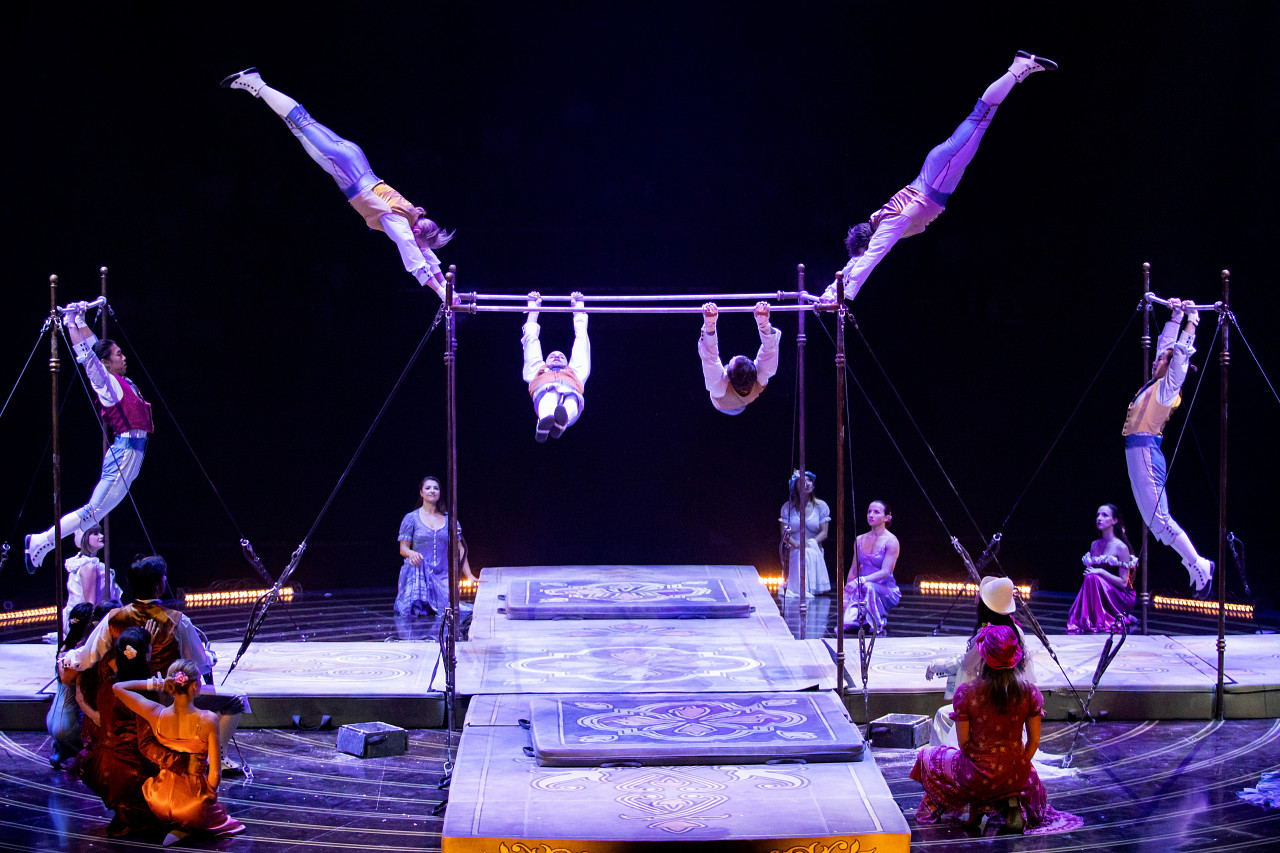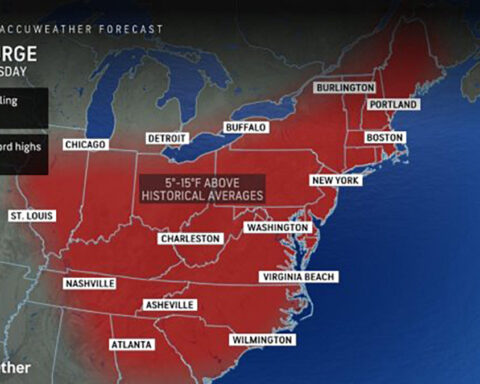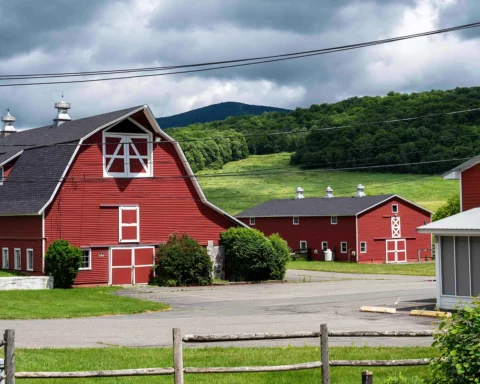Podcast (will-call): Play in new window | Download
Subscribe: RSS
Above: Cirque du Soleil’s Corteo comes to Worcester’s DCU Center January 12 – 15, 2023; photo by Maja Prgomet.
And this is Episode Number 75 of Will Call here on the Greylock Glass. I’m your host Jay Velazquez, and I’m so pleased to have you with us for this show, which first aired Thursday, January 12, 2023. I’m excited, because we’re going to be talking about an extremely exciting show from the internationally beloved Cirque du Soleil.
Opening at the DCU Center in Worcester Massachusetts January 12 and running through the 15th the magical performance, Corteo, is sure to bring gasps of amazement in disbelief from audience members young and old.
And, we are very grateful to have, as our guest, Frederick Umali, California native and internationally respected gymnast before he joined the original cast of Corteo at its inception in 2005. Mr. Umali performs in the gravity defying act Tournik, in which a group of artists cross paths in an act which marries horizontal bar techniques with circus arts. The artists perform at a central cube shaped structure with two additional bars on each side of the cube. The complexity of the fright pattern and the defiance of gravity will keep you on the edge of your seat.
Among other acts are the “Artist Marionette,” “Acrobatic Ladder,” “Chandeliers,” ” “Cyr Wheel,” and many more, some familiar, some so unique they challenge the imagination.
OUR REVIEW
I don’t know that I should, or even care to, give away any more details than are in my interview with Mr. Umali. Besides, the trailer I’ve embedded shows you all you should need to know about what you’ll see.
I can only say that 2022 was the hardest year of my 54 year old life, and it carried over into the first couple weeks of 2023. I had the opportunity to take in Corteo, and was sure I wasn’t really in the mood for clowns and acrobats and balloons on the drive halfway across the state to the Worcester DCU center.
By the end of the performance, however, I felt that I’d been scrubbed raw with the stiff-bristled brush of optimism.
Until I saw this show, nothing had drenched me with the childlike wonder and awe of a 10-year-old since I was, well, 10 years old.
Nothing you stream to your TV, no matter how big it might be, 10 nights combined, can match the spectacle that is Cirque du Soleil.
No amount of special FX, CGI, or green screen stunts can compare to the soaring, spinning, flying through the air (almost always with NO FREAKING NET) explosions of color and flash and sparkle, all accompanied by sensuous live music.
Nothing will draw out innocent, healing laughter and perpetual smiles quite the way this circus will.
I BEG of you, if at all possible, start 2023 off by seeing “Corteo,” a performance that will make you believe in…every magical, wonderful thing you thought was impossible again.
The full frontal assault of beauty, gracefulness, and elegance brought tears to my eyes on and off for an hour and a half.
In traditional Cirque du Soleil fashion, the entire extravaganza is an explosion of color and light as well with elaborate stage features, mind blowing set creations, and lush costumes and make up.
Corteo, created and directed by Daniele Finzi Pasca, first premiered in Montreal in 2005 and has visited more than 60 cities in 19 different countries as a big top show before transforming into an arena show in 2016. More than 9 million people have been enthralled by the world of Corteo.
And now joining me by Skype I am pleased to welcome Frederick Umali.
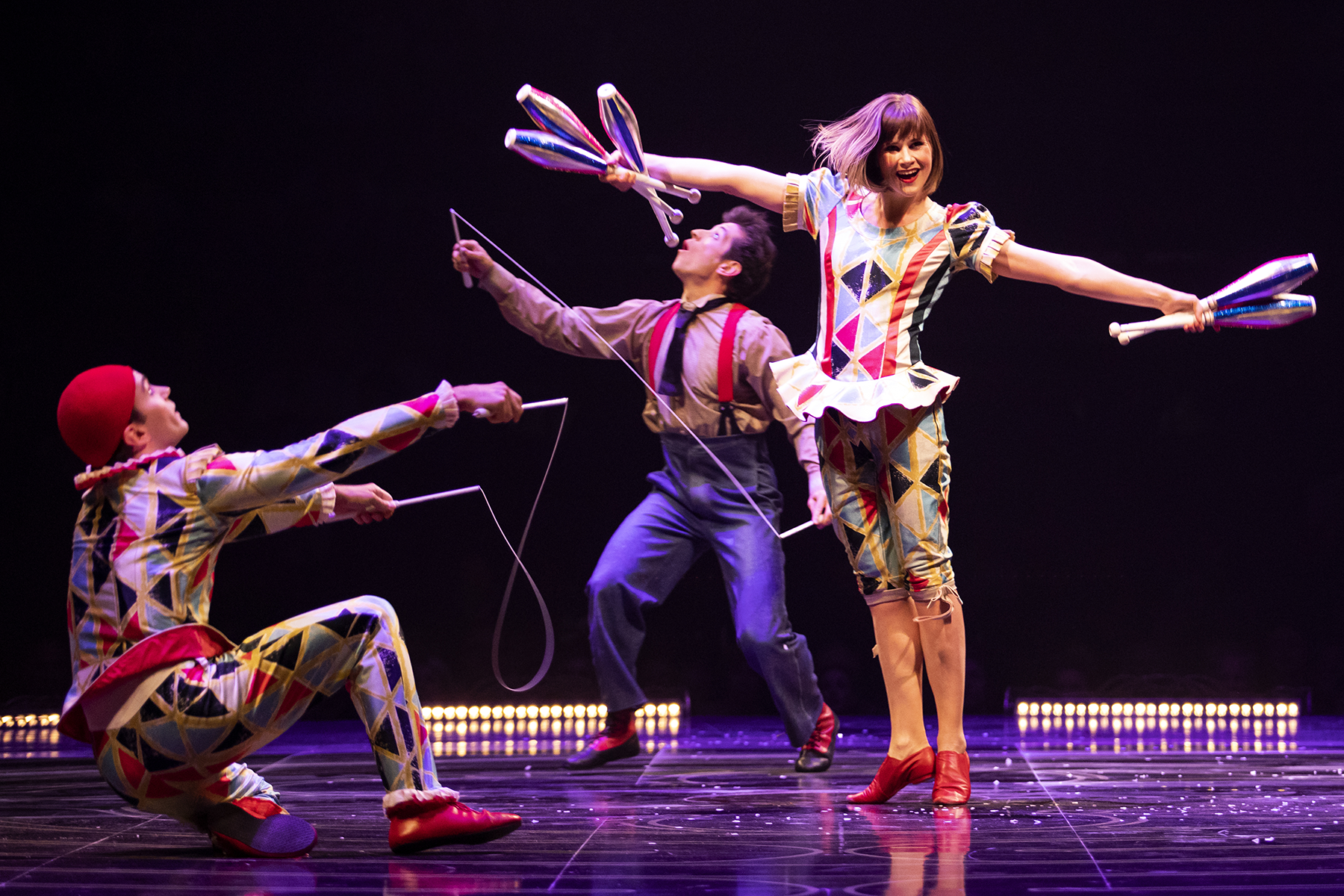
Three young artists perform fast-moving feats of prowess in a surprising act that blends juggling and acrobatics. With unsurpassed style, they defy the law of gravity as they juggle successively with rings, hoops and clubs; photo by Maja Prgomet.
NTRVW: Frederic Umali
Will Call: And with me on the line is Frederick Umali, who has been with the Cirque du Soleil’s quartet since the very beginning. Frederick, it is such a pleasure. Thank you.
Frederic Umali: Thank you. Nice to be here.
Will Call: Now, you have been with the Cirque du Soleil for a long time now. And it’s my understanding that you were in you’re an actor in acrobatics, as in a sport before that. How long ago did you get into into that?
Frederic Umali: So with the show currently in its form, the act that I’ve been doing called Tunic, I specifically learned this act for this show that was created back in Montreal back in 2004, 2005, I believe. I started gymnastics when I was about six years old, and I was competitive nationally and internationally for the United States up until I retired back in 2004. And pretty much as soon as I finished my gymnastics career, I went right into some disarray.
Will Call: Now, you have said in other interviews that you’ve borrowed a lot, obviously from gymnastics, but that they’re not the same. What do you mean by that? What’s what’s different than the you know, when we see that you’re you’re doing this, the tourniquet act, it’s very gymnastic. A lot of things that you would see at the Olympics, for example, you know, feats that you’d see on the uneven bars or something. What’s different between the acrobatics you do with Cirque du Soleil and gymnastics?
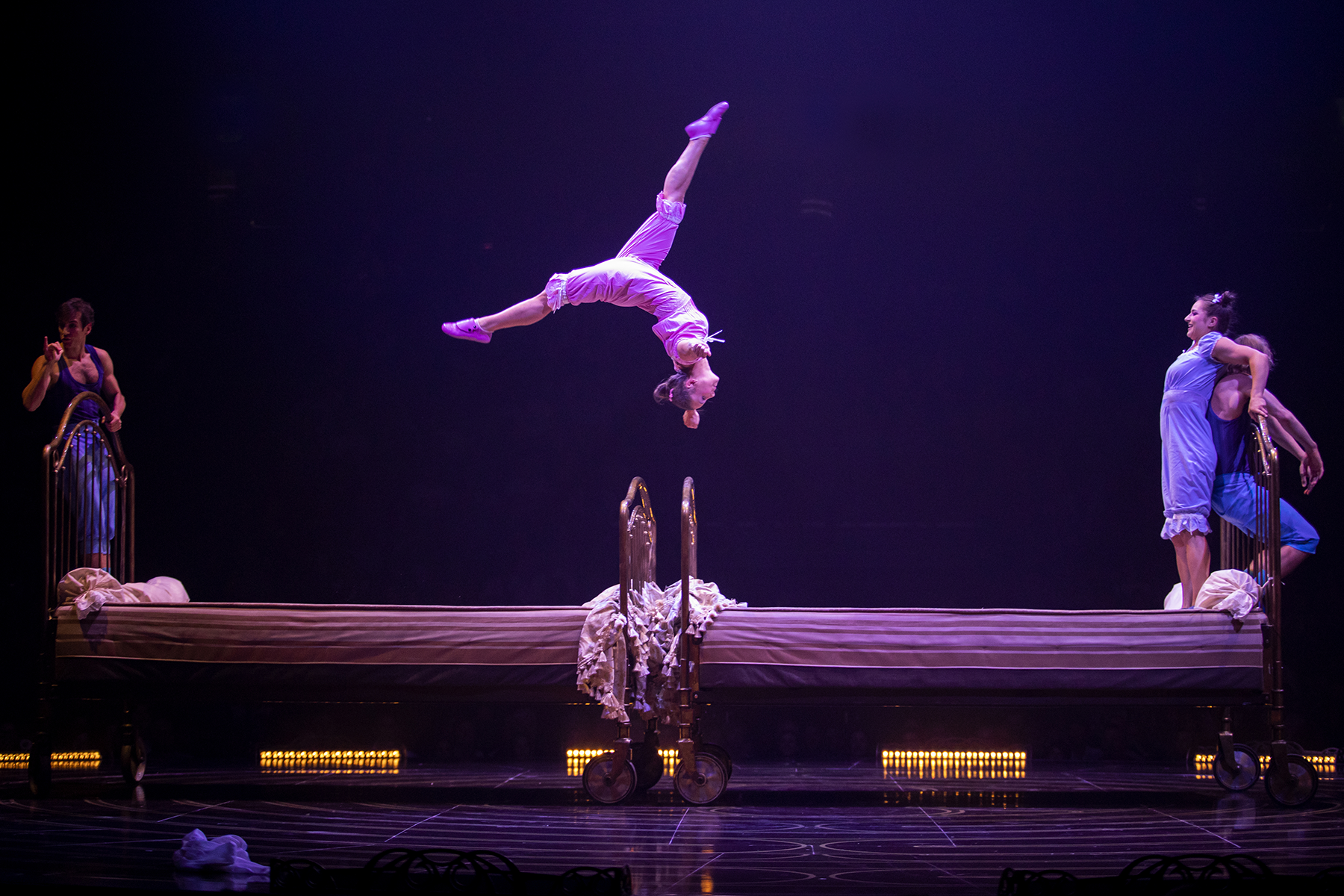
Like a gaggle of young kids playing in their grandparents’ room, six artists jump on two 600-pound beds that move on rotating platforms. In a playful atmosphere, they perform acrobatic feats, each more daring than the last; photo by Maja Prgomet.
Frederic Umali: So the biggest difference that I’ve learned over the years of performing in professionally in shows for such a play is in sport. We are very competitive. We we train for years and years and years for very, very specific competitions. But a lot of the acrobatics and discipline and strength and flexibility are things that I’ve learned are directly related to what I needed in terms of basic skills and discipline to be able to to recreate my acrobatic movements specifically for this show. And they’ve all helped all the things that I’ve done before have helped me to build that for what I do now.
Will Call: Well, that makes sense. That makes perfect sense. Although it seems that to do the number of shows that you do and travel around the world to do it while you did compete internationally, would you say that doing acrobatics today is more or less rigorous, more or less demanding than your life as a gymnast?
Frederic Umali: It’s a little difficult to compare the two because obviously in sport we train for a long period of time for very specific competitions in the Cirque du Soleil theatrical, acrobatic kind of arena. We have to maintain a high level very, very consistently to stay healthy and be able to perform at a level that is that will entertain the audience. So I would say vigorously now, the physical demand is is high, but not as high as sport. But the consistency level is is something that is more of a challenge to keep.
Will Call: Interesting. And you’ve been doing this well, it’ll be 19 years pretty soon.
Frederic Umali: You were? Yeah, just about.
Will Call: Yeah. You said that you had retired from gymnastics, which is interesting to think that that was almost 20 years ago. I would think that it’s it’s. I can’t even imagine doing it. 20 years ago myself, I was, you know, 30 something. Do you feel or do you have to be more mindful at this stage in your career to do some of the amazing, astounding feats that you do every night with Cirque du Soleil as as somebody who’s as an adult well into adulthood?
Frederic Umali: Oh, absolutely. Yeah, absolutely. You know, as you mature and you do this type of work, it is a profession. And we do take steps to take care of our our health and our bodies and to be able to maintain the type of physicality that we need to perform at the level that we do. Obviously, as we get older, our body ages and we need to modify and do things sort of differently. But the mindset is always very similar and as long as you’re keeping consistent with the things that you do to take care of yourself, your mind, body and health, you know, you’d be surprised with what the human body is actually capable of. But I love what I do and it is my profession for the past eight years or so, and I don’t think that I would have it any other way.
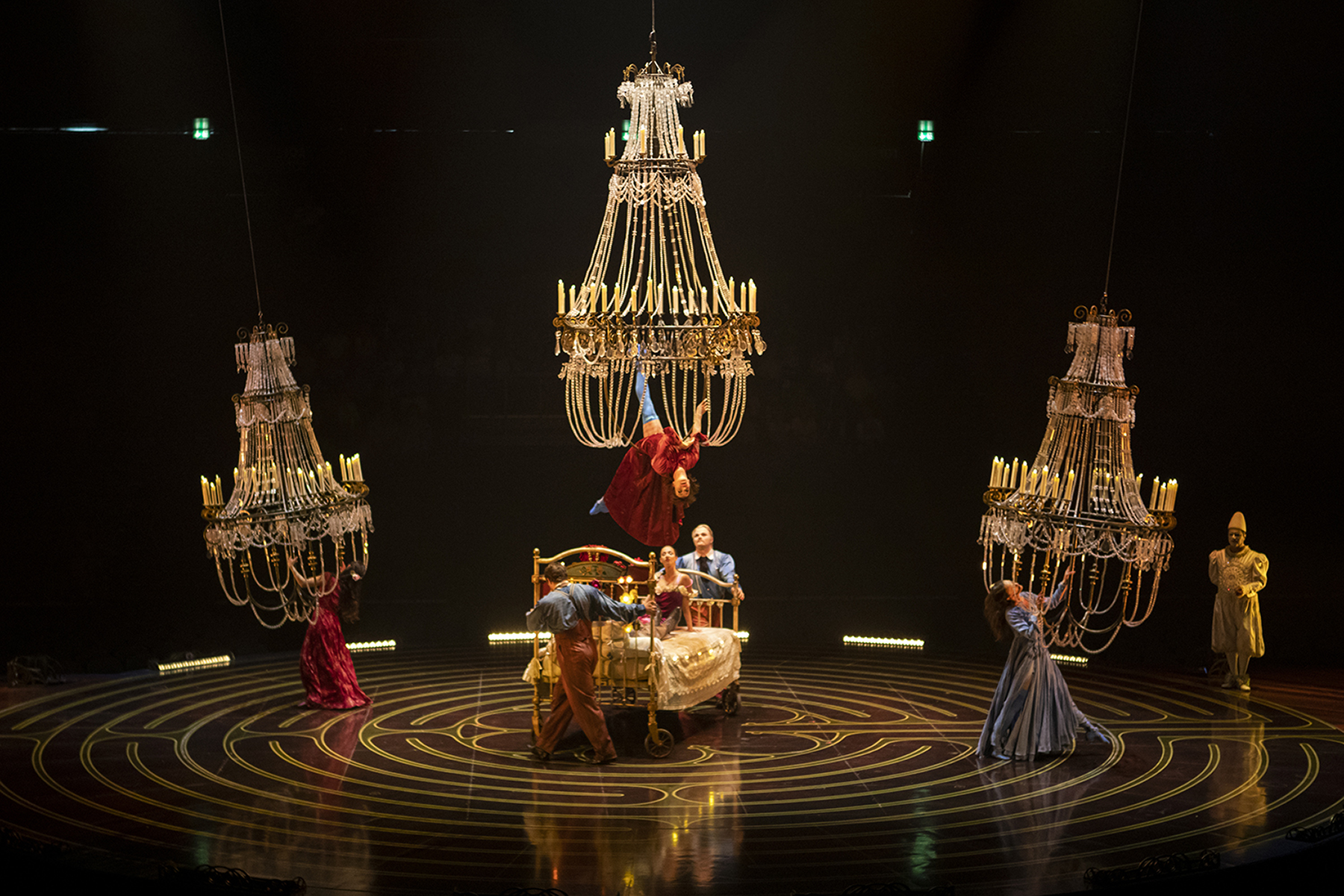
Four women, the Dreamer Clown’s former loves, come together in dreamlike joy. They perform aerial acrobatics on three giant chandeliers that spin above Mauro’s bed; photo by Maja Prgomet
Will Call: All right. Well, I think a lot of people give, you know, Tom Brady of football fame, a lot of credit for doing what he has to do, but he doesn’t have to do with you what you have to do. He doesn’t have to literally fly through the air for about 20 minutes or so. And, you know, if he can snap that football, you know, to receiver, he’s done for the for the for that little bit. Of course, you don’t have people £250 piling up on you either if you if you miss. So there may be a difference there. But you mentioned that it’s amazing what the human body can do. I have heard it said that. And seeing actually comparisons of gymnastics from the 1960s and today and the things that sport has pushed the human body to be able to do just in the last 30 years would have seemed almost impossible. In our grandparents time, the things that that you can you can do. Do you find that it is always reaching? I mean, how do you find it to be always reaching for that next amazing pinnacle of performance?
Frederic Umali: Hmm. That’s an interesting question. But, you know, like going through my career and and having to evolve constantly and and grow and push myself, you realize that, you know, obviously, technology has a lot to do with the improvement of sports in general. We have better we have better technology to analyze what we do. Coaching gets better. Things evolve on technique, coaching practices and things like this that make that that we gain the knowledge to push the body to a more efficient state and and to understand how we move and how we develop to really go to another level. Because even as I’ve grown as an acrobat and an artist, I see the new generation coming up, the strength and things that they’ve had to go through and learn to be able to accomplish the level of acrobatics and, you know, the the risk and rivers you need to to overcome to to perform at this level. So and I think that that that is a pretty good general statement for most professional sports like we push ourselves to to extreme levels to perform and to be better than the previous generations and learn from that also. That’s my little take on that.
Will Call: Well, I mean, it looks like magic. I mean, it looks like the stuff of of superhero comics sometimes. And, you know, I think one of the parallels, or least similarities I see in the sport of the street, sport of parkour, which is sort of a cousin of of acrobatics and the things that people do there and just and even just rock climbing it, it boggles the mind. But at the same time, your art art has always been. As long as history has been recorded, and I’m sure far before that coming out of the east along the Silk Road. Performers, acrobats, circuses. I mean, these go back to into folk history and to folk tales. Do you ever consider the fact that what you’re doing, what Cirque du Soleil is doing, is part of a tradition that literally winds back into the mists of time?
Frederic Umali: Oh, absolutely. I mean, circus has been a long, long, long tradition throughout human history. And performing the arts is something that has a fundamental root, I think, in that encompasses physical art as opposed to like sculptures or painting or anything like that. But what we do is physical, physical arts, and we try to tell stories in that physical arena. I guess you would say that. Yeah, I mean, we are I think we are still a part of that history.
Will Call: Yeah. And it’s one of the few things that people actually still think about running away to. People still think about running away to join the circus when they’re kids. I don’t know that there are two too many careers that kids still think about running away to do. But I still think I have to worry that my kids are going to are going to run away. Well, not worry, actually, because now I know that there’s so much professional sophistication involved. You have a child, at least in the interview that I’d read, you had a daughter. Is that is that the case or do you have more children?
Frederic Umali: No, I just have the one daughter.
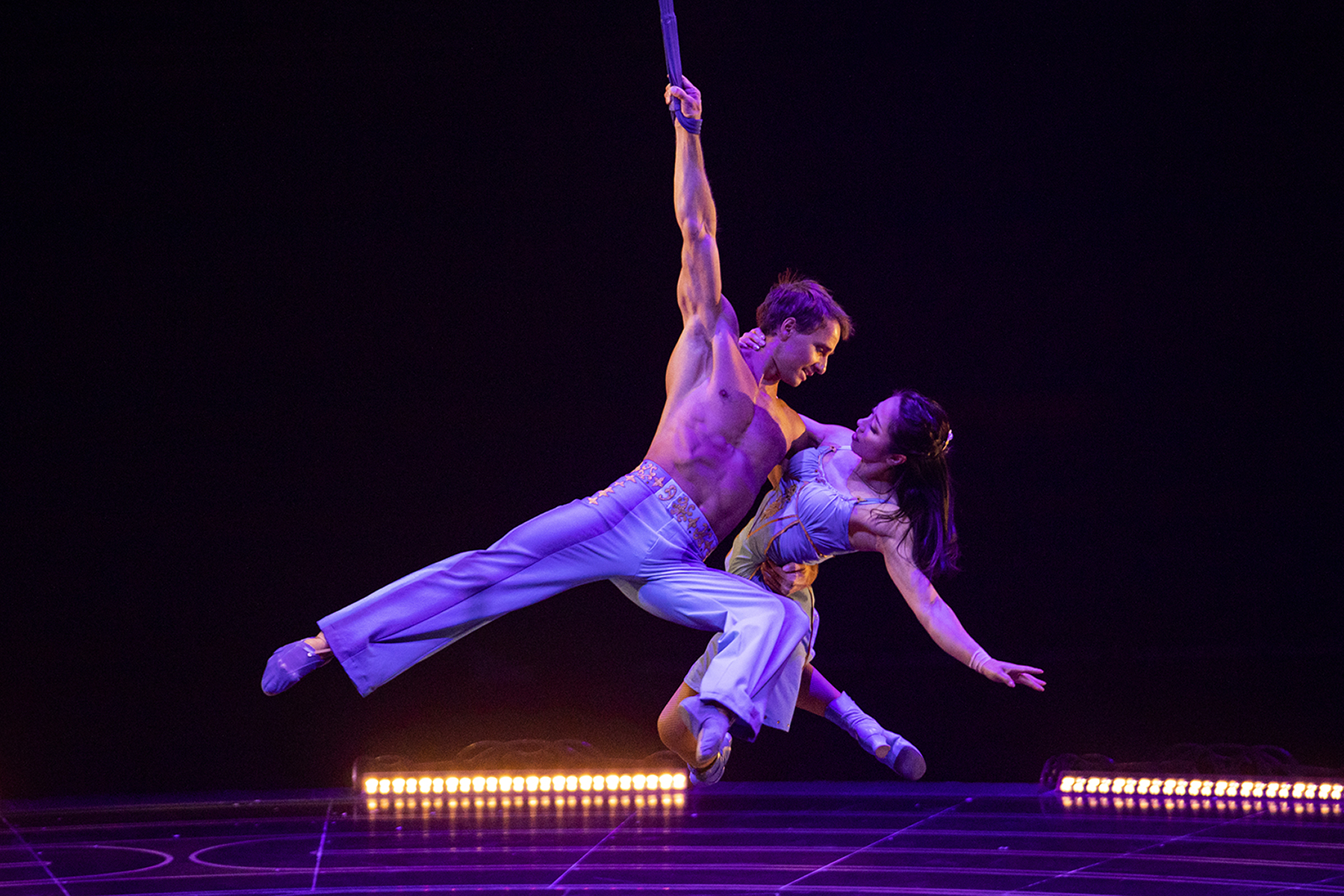
In this mesmerizing act, a duet uses aerial straps to create a magical and tender connection that enchants the audience with beautiful displays of agility, balance and strength; photo by Maja Prgomet.
Will Call: Would you would you be happy if she chose a life of of of the circus and acrobatics?
Frederic Umali: Yeah, absolutely. The things that you learn from this, this lifestyle are very unique. And working for a company like Cirque du Soleil. We are an international company and we have we meet people from all over the world. It’s it’s a very unique environment. And I have experienced so many things from working with this company, seeing the world, you know, traveling here and there, getting a taste of different cultures and really, really growing as a person just from being exposed to all those those differences and that I wouldn’t have experienced, like living and working and having a career, you know, back home where I grew up.
Will Call: And that was out in California. Was that was it in San Jose or. No. Not San Jose. Where was it?
Frederic Umali: Oh, I grew up in yeah, I was born and raised in San Jose.
Will Call: San Jose. Okay.
Frederic Umali: I was about 20 years old.
Will Call: Yeah. I lived just south of you for a while. And in Santa Cruz, just over the mountain, I used to take the Highway nine on my motorcycle to San Jose pretty frequently. So, yeah, I love it. I love it. And I don’t always miss California, but I sure miss Highway nine between Santa Cruz and San Jose. But it’s a great drive. It’s a great drive. In fact, my favorite time is when the moon is full and it’s been foggy. If you’re on Highway nine at just just the right night, it’s often in the autumn when you’ve had warm days and cool nights and you’re above the clouds and so you’re driving higher and higher on Highway nine until you get to this point where the clouds are silver, it looks like you’re above just looking down on an ocean of silver with islands. My favorite. I should have taken pictures that when I when I was there. But if you happen to go say hello for me. The the the thing about you said something about telling stories and Cirque du Soleil tells a lot of stories. Criteo is a very unique story because it’s literally about well, it’s it has circus as a theme and its central character as a clown. Tell us about this, this story.
Frederic Umali: So the story, of course, revolves around the life of a clown and famous novelist. And throughout his life, he’s had it’s a story about his life and the people that he’s experiences that he’s had. It is like kind of dream, like a live dream of people coming through, celebrating different moments of lives, of the women that he’s met, the friends that he’s had, childhood memories and things like this. And each of the acts kind of represents these these moments in his life and. That we’re really here to celebrate that.
Will Call: Hmm. Because he’s thinking. Dreaming of his own. His own funeral. Correct.
Frederic Umali: Yeah. Basically, this is this is the basis of on the show. And it’s his imagination on what would happen. And. And his looking back and reflection on on all of those, the loved ones that he’s had throughout his life.
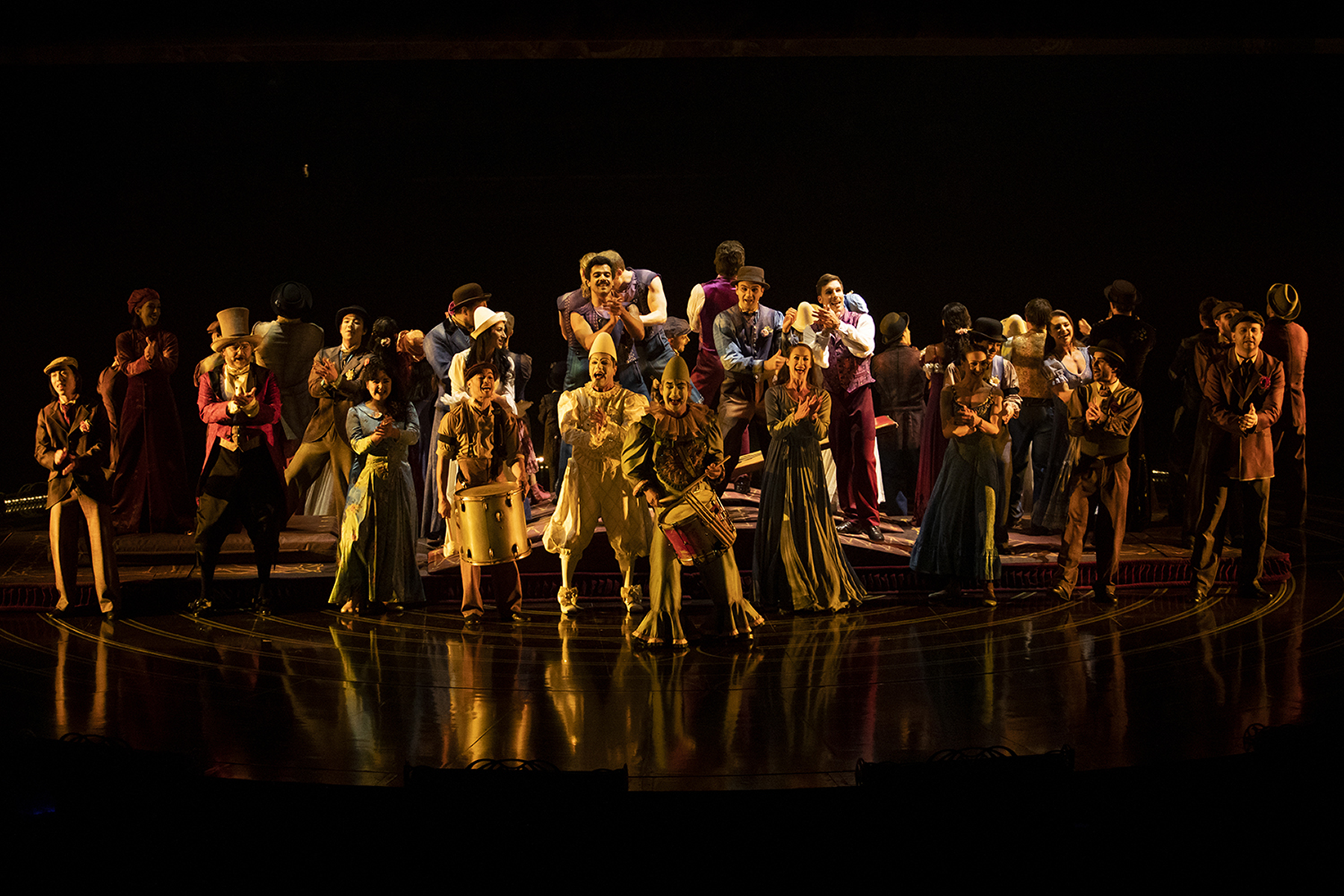
Will Call: Now, originally, this show was conceived and staged as a big top. Performance. And now it’s it’s an arena performance. What’s the difference?
Frederic Umali: Well, I mean, the difference main difference between an arena and a big office with a big top. We travel with all of our obviously a large tent and we have the whole logistics to create this basically a small city. And we stay in in markets much longer. With the marina, we we basically moved with like a very, very condensed version of that show because we don’t need the big top. We have, you know, the physical structures of other arenas and are able to move much quicker, put up the stage and everything much quicker because we don’t have all this logistics around it. But and we can get to more markets that we wouldn’t readily be able to accommodate us because it’s much more more mobile and fast moving paced show.
Will Call: I can understand that not every city has a great open space that you can, like you said, just create a little village out of that that’s accessible to the to the public. Is there anything about being in a big top for this particular show that that felt really sort of right on on the money?
Frederic Umali: I mean, the biggest difference was obviously with the big top we set up in a city and we were there for much longer. So we can experience the cities longer and get a feel of the people more. And but with with an arena, we don’t really get that so much. It’s really we do our shows and we move quite quickly. Obviously, we’re in the city for maybe about a week or so.
Will Call: Right. I guess I wonder if from the public’s point of view there was something kind of neat about going to see a show. That revolves around the life of a clown in a big top, in a sort of traditional venue. Of that a circus would be in. But I suppose there’s a lot of reasons why those have been harder and harder to stage. I know that I was fortunate when I was very, very young to see. A Barnum and Bailey, Ringling Brothers and Barnum and Bailey Circus in a tent. And they did away with that not too long afterward. And I took my children to see Barnum and Bailey the year before they decided to go out of business permanently. And that was in an arena in Albany. And it’s the same magical it’s magic, but it’s a slightly different feeling. I mean, between the big top and in an arena. Have you been to Worcester before? Have you toured through central Massachusetts?
Frederic Umali: Yes, I have. I’ve been to I’ve been to Massachusetts a few times. Boston And actually I was in Worcester before and I think I believe was back in 2000, 18 or 19. Exactly. Yeah, I have that passed through there.
Will Call: Is this the first? Is this the first staging of this show since the pandemic, or has it been.
Frederic Umali: No, we’ve actually been to for quite a while.
Will Call: Oh, no kidding.
Frederic Umali: The courtyard came back. Yeah, it’s been quite a while. We just finished our marketing in Europe, and we’re beginning our North American leg just at this moment. So we’re about our second city in at the moment and will continue here for quite some time.
Will Call: Do you have any do you know if you have any requirements? No. There’s no masking or anything like that. Has to has to go on, is there?
Frederic Umali: I believe the show abides by whatever local laws and regulations that they have, but currently we don’t have any national policies put in place right now.
Will Call: Well, I don’t have too many other questions because I don’t want to actually give too much away. I will say that the Spotify playlist includes music from the show, and I’m addicted to that. It’s a very sensuous, very visceral sound. I’ve seen some of the videos of some of the performance. It’s just it’s dreamlike. It’s it’s very rich. It’s a very visual show, very colorful as as Cirque du Soleil usually is. But it’s especially so and it’s it’s it’s very fun. Tell me something. When you were a child and you imagined the circus or maybe you had a chance to go to the circus. Do you look at, say, videos of your work and compare them to the sort of dreamlike quality that you might have had in your imagination as a child and say, Yeah, yeah, I pretty much hit the mark on that. Or or do you think that there are yet greater, more wild productions that you’d like to to see yourself in?
Frederic Umali: Speaking directly about Kyoto itself. The yes, like all the things that you said about it being a rich environment, very colorful, very joyous, we we we are trying to portray this on stage as artists and as actors and acrobats. And we we really try to give something unique. And what makes Cocktail very unique is for me personally, is the humanity of the show. We are in very natural makeup, even though our costumes are absolutely amazing. And yeah, we try to make like a very unique experience for for the for the public. And we have, I believe, something very special in the show. And it’s very soulful and heartfelt and enjoyable for all ages of people. And I think it’s it’s a very strong representation of capabilities of what this company proposes and can give to the public. So if you get a chance to see it, amazing.
Will Call: Oh, I, I am delighted that I’m going to get to see it and I will tell you that. I see what you do, and I think maybe it’s not too late. Maybe I could lose a bunch of weight and and start training right now. And maybe it’s not too late to run away and join the circus. Do you have any advice for people?
Frederic Umali: You’d be surprised.
Will Call: Oh, yeah. Do you have some people that.
Frederic Umali: Are looking to pursue this? Oh, we have. We have people of all ages. People are actors from from young to old, from all different backgrounds, gymnasts, dancers, actors, actresses, singers. Live musicians, for sure. Which makes the music amazing. If you if you like, of music always, always love music. And yeah, we have we have a whole catering staff and an audience and 28 different nationalities that are just represented in this show.
Will Call: And I’m sure you have communications people and who knows, maybe you could use an old podcaster to come by. Well, you never know.
Frederic Umali: Yeah.
Will Call: Maybe I will. It’s not too late to run away and join the circus. Frederick, I want to thank you so much for your time, your generosity, and for the commitment to the art that you clearly have have manifested in a way that makes me still, even at the tender young age of 54. Believe in magic. Stay safe. Enjoy the snowstorm that we’ve got coming up this week weekend. And I can’t wait to see you on stage.
Frederic Umali: Great. Thank you very much for your time. I really appreciate being here.
The spectacular Corteo runs plays at the Worcester DCU center until January 15 tickets are available at cirquedusoleil.com. Look for the link in the show notes to this episode. Thanks again for tuning in and I hope to see you in the audience.
